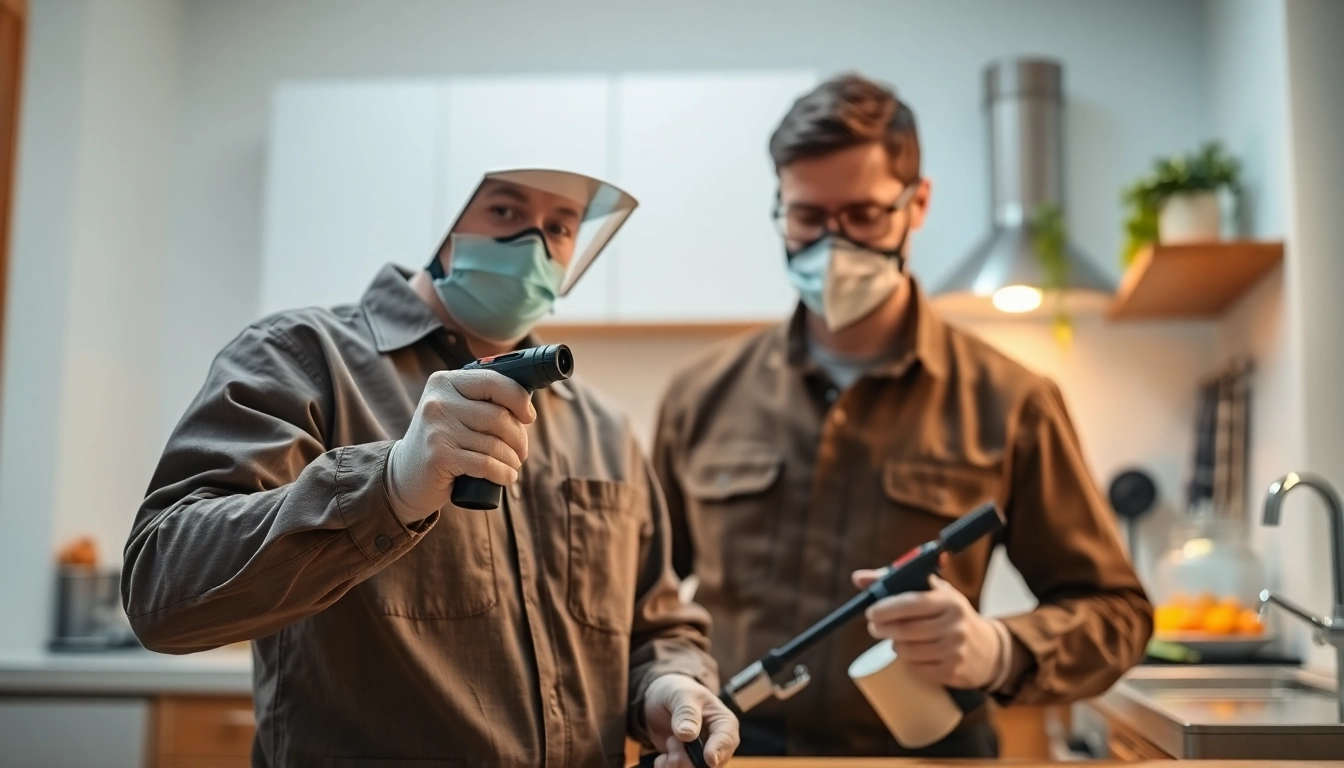Understanding Pest Control Services
Pest control services are essential for maintaining a healthy and safe environment, whether in residential or commercial settings. From everyday nuisances to potential health hazards, the importance of a thorough pest management strategy cannot be overstated. These specialized services not only focus on eliminating current pest problems but also emphasize prevention and long-term management to ensure a pest-free environment. Engaging professional pest control services can help identify and mitigate risks that pests can bring.
What are Pest Control Services?
Pest control services encompass a range of techniques and methodologies designed to manage and eliminate pests. These services typically include inspections, treatments, and proactive strategies to prevent infestations. Pest control professionals leverage their experience and knowledge of pest behavior, life cycles, and habitats to provide effective solutions tailored to each situation. The ultimate goal is to minimize pest populations to a manageable level while reducing the health risks associated with infestations.
Types of Pest Control Treatments Available
There are several types of treatments available through pest control services, each tailored for specific pests and situations:
- Exclusion Services: This involves sealing entry points and making structural adjustments to prevent pest ingress.
- Biological Control: Utilizing natural predators or pathogens to control pest populations, such as introducing ladybugs to manage aphid populations.
- Chemical Treatments: Applying insecticides or pesticides, which can be used in various formulations, including sprays, baits, or foggers.
- Integrated Pest Management (IPM): A holistic approach combining various methods to ensure effective long-term management of pests.
- Thermal Treatment: Utilizing heat to eliminate pests, such as in bed bug control.
Why You Need Professional Pest Control Services
Engaging a professional pest control service not only ensures that pests are effectively eradicated but also provides numerous advantages that DIY methods often cannot match:
- Expert Knowledge: Professionals have extensive training and possess knowledge of the latest methods and products, ensuring effective treatment.
- Time-saving: Hiring experts allows property owners to focus on their daily tasks rather than worrying about pest problems.
- Health and Safety: Professionals use safe, sustainable methods to manage pests while minimizing risks to people and pets.
- Long-term Solutions: Pest control services provide preventive measures that help create barriers against future infestations.
Common Pests and Their Impact
Identifying Household Pests
Residential pest issues vary widely but can be categorized into several common pests, including but not limited to:
- Ants: Often found in kitchens and bathrooms, ants can invade nests and affect food supplies.
- Termites: These wood-destroying insects can silently damage structural integrity over time.
- Rodents: Mice and rats can pose significant health risks by spreading diseases and contaminating food sources.
- Bed Bugs: Small, nocturnal pests that feed on human blood, leading to itchy bites and sleepless nights.
- Roaches: Cockroaches are known for their rapid reproduction and ability to thrive in unsanitary conditions, posing health risks.
Health Risks Associated with Common Pests
The presence of pests within a home or business can lead to various health risks. For instance, rodents can carry diseases such as hantavirus and leptospirosis, while cockroaches are linked to asthma and allergies. Additionally, insects like mosquitoes and ticks are known carriers of dangerous viruses such as West Nile Virus and Lyme disease. Understanding these risks emphasizes the importance of effective pest control and timely interventions.
The Economic Impact of Pest Infestations
The financial implications of pest infestations can be staggering. Beyond the initial costs associated with treating infestations, pests can lead to significant property damage and loss of inventory, particularly in businesses. The National Pest Management Association highlights that termites alone cause about $5 billion in damages each year in the U.S. Proper pest management can help avoid these losses and contribute to long-term savings by protecting property value.
Choosing the Right Pest Control Service
Factors to Consider When Selecting a Provider
Choosing the right pest control service provider is critical for effective management and prevention. Several factors to consider include:
- Experience and Reputation: Look for providers with solid track records and positive customer reviews.
- Certification: Ensure they have the appropriate licenses and certifications to operate in your area.
- Service Offerings: Review the range of treatments they offer to ensure they can handle your specific pest issue.
- Warranty and Follow-up Services: Reliable companies often provide warranties for their work and follow-up services.
Questions to Ask Your Pest Control Expert
Before signing a contract, it’s important to ask your potential pest control provider several key questions, such as:
- What methods do you use, and are they environmentally friendly?
- How long will the treatment take, and when can I expect to see results?
- What safety precautions do you take to protect my family and pets?
- Do you provide any guarantees for your services?
- How do you handle follow-ups if I experience a resurgence of pests?
Understanding Service Packages for Pest Control
Pest control services may offer various packages catering to different needs, such as:
- One-time treatments: Immediate solutions for urgent pest issues.
- Preventive plans: Regular inspections and treatments designed to prevent infestations.
- Comprehensive service packages: All-in-one plans that cover multiple types of pests and include follow-up treatments.
Understanding these packages and their value propositions can help consumers make informed decisions tailored to their specific requirements.
Preventive Measures for Pest Control
Eco-Friendly Pest Prevention Tips
Preventing pest issues is often more effective and sustainable than treating an existing problem. Here are some eco-friendly tips for potential pest prevention:
- Maintain cleanliness: Regular cleaning eliminates food sources and nesting sites.
- Seal entry points: Inspect doors, windows, and foundation cracks to block pest access.
- Utilize natural repellents: Essential oils such as peppermint or lavender can repel pests without harmful chemicals.
Maintaining a Pest-Free Home Environment
Creating and maintaining a pest-free home involves diligence and proactive steps. Here are several strategies to achieve this:
- Regular inspections: Conduct routine inspections, particularly in high-risk areas like basements and attics.
- Yard maintenance: Trim shrubs and trees and keep vegetation away from the house to diminish hiding spots.
- Proper waste management: Secure rubbish bins and ensure regular disposal to avoid attracting pests.
Seasonal Considerations for Pest Control
Understanding the seasonal behaviors of pests can help in crafting a proactive pest management plan. For instance, rodents seek shelter during colder months, while mosquitoes are more active in warmer months. Homeowners should adjust their pest control strategies accordingly, incorporating seasonal treatments and preventive practices.
Evaluating Pest Control Effectiveness
How to Assess the Success of Your Pest Control Services
To determine the effectiveness of pest control services, homeowners should consider tracking pest activity. This can involve keeping records of any sightings, measuring food storage changes, and using monitoring traps. An effective pest management service will offer clear results, ideally leading to a significant reduction in pest activity over time.
Customer Feedback and Ratings
Reviewing customer feedback and online ratings can provide valuable insights into the quality and reliability of pest control services. Prospective clients should seek references and testimonials, as these reflect a company’s ability to deliver on promises and ensure customer satisfaction.
Long-Term Pest Management Strategies
Implementing long-term pest management strategies ensures sustained success. This includes choosing ongoing prevention plans, continuous education on pest behaviors, and maintaining communication with pest control professionals regarding observed changes in pest behavior or environmental factors that could lead to infestations. Consistent assessment and adaptation are key components in keeping properties pest-free over time.



